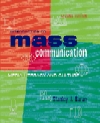Stanley J. Baran
| administrative research
|
studies of the immediate, observable influence of mass communication
|
 |
 |
 |
| bounded cultures
|
groups with specific but not dominant cultures
|
 |
 |
 |
| communication
|
the transmission of a message from a source to a receiver
|
 |
 |
 |
| concentration of ownership
|
ownership of different and numerous media companies concentrated in fewer and fewer
hands
|
 |
 |
 |
| conglomeration
|
the increase in ownership of media outlets by larger, nonmedia companies
|
 |
 |
 |
| convergence
|
erosion of traditional distinctions among media
|
 |
 |
 |
| critical research | studies of media's contribution to the larger issues of what kind of nation we are building,
what kind of people we are becoming
|
 |
 |
 |
| cultural definition of communication
|
communication is a symbolic process whereby reality is produced, maintained, repaired,
and transformed; from James Carey
|
 |
 |
 |
| culture
|
the world made meaningful; socially constructed and maintained through communication,
it limits as well as liberates us, differentiates as well as unites us, defines our realities and
thereby shapes the ways we think, feel, and act
|
 |
 |
 |
| decoding
|
interpreting sign/symbol systems
|
 |
 |
 |
| dominant culture
|
the culture that seems to hold sway with the large majority of people; that which is
normative
|
 |
 |
 |
| encoding
|
transforming ideas into an understandable sign/symbol system
|
 |
 |
 |
| feedback
|
the response to a given communication
|
 |
 |
 |
| hypercommercialism
|
the growth of the amount of advertising and the mixing of commercial and
noncommercial media
|
 |
 |
 |
| inferential feedback
|
in the mass communication process, feedback is typically indirect rather than direct; that
is, it is inferential
|
 |
 |
 |
| interpersonal communication
|
communication between two or a few people
|
 |
 |
 |
| macro-level effects | media's wide-scale social and cultural impact
|
 |
 |
 |
| mass communication
|
the process of creating shared meaning between the mass media and their audiences
|
 |
 |
 |
| mass medium (pl. mass media)
|
when a medium carries messages to a large number of people
|
 |
 |
 |
| medium (pl. media)
|
vehicle by which messages are conveyed
|
 |
 |
 |
| micro-level effects
|
effects of media on individuals
|
 |
 |
 |
| narrowcasting
|
aiming broadcast programming at smaller, more demographically homogeneous
audiences
|
 |
 |
 |
| niche marketing
|
aiming media content or consumer products at smaller, more demographically
homogeneous audiences
|
 |
 |
 |
| noise
|
anything that interferes with successful communication
|
 |
 |
 |
| oligopoly
|
a media system whose operation is dominated by a few large companies
|
 |
 |
 |
| ritual perspective
|
the view of media as central to the representation of shared beliefs and culture
|
 |
 |
 |
| synergy
|
the use by media conglomerates of as many channels of delivery as possible
|
 |
 |
 |
| targeting
|
aiming media content or consumer products at smaller, more specific audiences
|
 |
 |
 |
| taste publics
|
groups of people or audiences bound by little more than their interest in a given form of
media content
|
 |
 |
 |
| technological determinism
|
the idea that machines and their development drive economic and cultural change
|
 |
 |
 |
| transmissional perspective
|
the view of media as senders of information for the purpose of control
|



 2002 McGraw-Hill Higher Education
2002 McGraw-Hill Higher Education